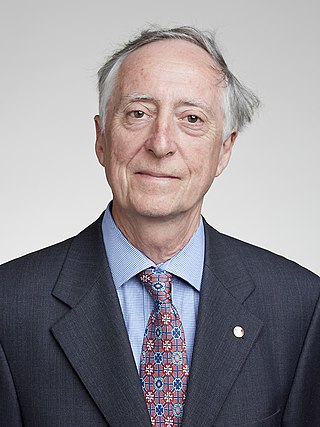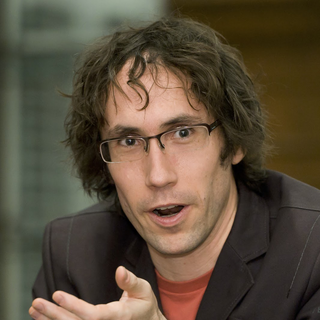Nicholas Hamilton Barton is a British evolutionary biologist.

Graham Arthur Charlton Bell is a British academic, writer, and evolutionary biologist with interests in the evolution of sexual reproduction and the maintenance of variation. He developed the "tangled bank" theory of evolutionary genetics after observing the asexual and sexual behaviour patterns of aphids as well as monogonont rotifers.

The American Society of Naturalists was founded in 1883 and is one of the oldest professional societies dedicated to the biological sciences in North America. The purpose of the Society is "to advance and diffuse knowledge of organic evolution and other broad biological principles so as to enhance the conceptual unification of the biological sciences."
Dolph Schluter is a Canadian professor of Evolutionary Biology and a Canada Research Chair in the Department of Zoology at the University of British Columbia. Schluter is a major researcher in adaptive radiation and currently studies speciation in the three-spined stickleback, Gasterosteus aculeatus.
Leah Edelstein-Keshet is an Israeli-Canadian mathematical biologist.

Kevin Leyton-Brown is a Professor of Computer Science at the University of British Columbia. He received his Ph.D. at Stanford University in 2003. He was the recipient of a 2014 NSERC E.W.R. Steacie Memorial Fellowship, a 2013/14 Killam Teaching Prize, and a 2013 Outstanding Young Computer Science Researcher Prize from the Canadian Association of Computer Science. Leyton-Brown co-teaches a popular game theory course on Coursera.org, along with Matthew O. Jackson and Yoav Shoham. Leyton-Brown serves as an associate editor for the Journal of Artificial Intelligence Research, the Artificial Intelligence journal, and ACM Transactions on Economics and Computation, and was program chair for the ACM Conference on Electronic Commerce in 2012. Leyton-Brown and coauthors have received the IJCAI-JAIR Best Paper Prize and numerous medals in international SAT competitions (2003–12). He was elected an AAAI Fellow in 2018.
Marcus William Feldman is the Burnet C. and Mildred Finley Wohlford Professor of Biological Sciences, director of the Morrison Institute for Population and Resource Studies, and co-director of the Center for Computational, Evolutionary and Human Genomics (CEHG) at Stanford University. He is an Australian-born mathematician turned American theoretical biologist, best known for his mathematical evolutionary theory and computational studies in evolutionary biology, and for originating with L. L. Cavalli-Sforza the theory of cultural evolution.

Demetri Terzopoulos is a Greek-Canadian-American computer scientist and entrepreneur. He is currently a Distinguished Professor and Chancellor's Professor of Computer Science in the Henry Samueli School of Engineering and Applied Science at the University of California, Los Angeles, where he directs the UCLA Computer Graphics & Vision Laboratory.
Leticia Avilés is an Ecuadoran evolutionary biologist and ecologist who studies the evolution of social behavior and the evolution of life history traits in metapopulations. Her methods include a combination of theory and empirical work, the latter using social spiders as a model system. Her research on these organisms has addressed questions such as why some spiders live in groups, why do they exhibit highly female-biased sex ratios, and why have they evolved a system where individuals remain in the natal nest to mate from generation to generation.

Judith (Judy) H. Myers is a Canadian-American ecologist. In 2014, she was elected president of the Canadian Society for Ecology and Evolution, and served in that role until 2016. Professor Myers is well known for her decades-long research into plant-animal-microbe interactions, including insect pest outbreaks, viral pathogens of insects, and pioneering work on biological control of insects and plants, particularly invasive species. Throughout her career she has advocated strongly for both the public understanding of science and for increasing the number of women in the STEM subjects: Science, Technology, Engineering, and Mathematics.

Bernard Joseph Crespi is an American professor of evolutionary biology at Simon Fraser University in British Columbia, Canada. His research focuses on social evolution across multiple scales, using genetic and ecological approaches. He is one of the initiators of the imprinted brain hypothesis.

Spencer Charles Hilton Barrett is a Canadian evolutionary biologist, formerly a Canada Research Chair at University of Toronto and, in 2010, was named Extraordinary Professor at University of Stellenbosch.
Ruth Geyer Shaw is a professor and principal investigator in the Department of Ecology, Evolution and Behavior at the University of Minnesota. She studies the processes involved in genetic variation, specializing in plant population biology and evolutionary quantitative genetics. Her work is particularly relevant in studying the effects of stressors such as climate instability and population fragmentation on evolutionary change in populations. She has developed and applied new statistical methods for her field and is considered a leading population geneticist.
Allison K. Shaw is an American ecologist and professor at the University of Minnesota. She studies the factors that drive the movements of organisms.
John Norton Thompson is an American evolutionary biologist.
Priyanga Amarasekare is a Professor of Ecology and Evolutionary Biology at the University of California, Los Angeles (UCLA) and distinguished Fellow of the Ecological Society of America (ESA). Her research is in the fields of mathematical biology and trophic ecology, with a focus on understanding patterns of biodiversity, species dispersal and the impacts of climate change. She received a 2021 Guggenheim Fellowship and received ESA's Robert H. MacArthur Award in 2022.
Catherine Kallin is a Canadian theoretical quantum condensed matter physicist whose research topics have included spin wave theory, the quantum Hall effect, frustrated antiferromagnets, chirality in superconductors, and high-temperature superconductivity. She is a professor emerita of physics and astronomy at McMaster University.

Jeremy Kerr is a biology professor at the University of Ottawa (uOttawa) where he holds the University Research Chair in Macroecology and Conservation. Kerr is a member of the NSERC Council, including its executive committee, and the past president of the Canadian Society for Ecology and Evolution (CSEE). He is the Chair of NSERC's Committee on Discovery Research and a founding member of its EDI subcommittee. In 2021, Kerr was elected to be a member of Sigma Xi Society and is an elected lifetime Fellow of the American Association for the Advancement of Science, and of the Royal Society of Biology.
Marc Johnson is a professor of biology at the University of Toronto Mississauga. He is the Canada Research Chair for Urban Environmental Science, and was the first Director of the Centre for Urban Environments from 2018-2023.
Judith Lee Bronstein is an American ecologist and evolutionary biologist who researches mutualisms, or positive species interactions. She has edited multiple books and volumes, including Mutualism, which was published by Oxford University Press in 2016.







